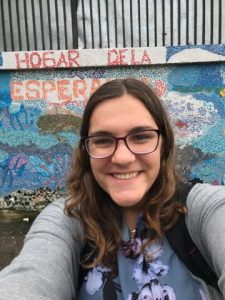Master of Divinity Student Hannah Purkey’s Story
Originally published in the Spring 2020 issue of the LifeTogether Magazine, Hannah Purkey shared her fieldwork story with us. As the world rapidly changed around us during the COVID-19 pandemic and physical distancing measures, so did Hannah’s fieldwork experience. Read her very different experiences below – both before and during the COVID-19 quarantine.
HOGAR DE LA ESPERANZA (HOUSE OF HOPE), PASO ANCHO, COSTA RICA
 I completed my fieldwork at an organization called Hogar de La Esperanza (House of Hope) in Paso Ancho, Costa Rica while also completing classes from a distance. Hogar de La Esperanza serves people who are affected by drug dependency and AIDS through wholistic support, including medical care, and a place to live.
I completed my fieldwork at an organization called Hogar de La Esperanza (House of Hope) in Paso Ancho, Costa Rica while also completing classes from a distance. Hogar de La Esperanza serves people who are affected by drug dependency and AIDS through wholistic support, including medical care, and a place to live.
I was originally very nervous to work in this setting. I’d never done anything like it and did not know what to expect. I anticipated my challenges would be connecting culturally and situationally, but my joys would be getting to see how God is moving and breathing in their lives. Connecting was hard at first because of my own personal hang-ups, but I saw God moving my heart through that experience and found again that spiritual growth happens when we get uncomfortable.
One Saturday I accompanied people from Hogar de la Esperanza to “La Carpa” (which translates to tent), where people experiencing homelessness can come, get breakfast, and have conversations with residents of Hogar de La Esperanza and other community members. I saw two middle aged men in torn clothing eating together with no volunteers or residents. I went and sat with them. It was uncomfortable at first, but we soon were talking about our families, places of origin, and then faith. This man had struggled so much with his faith, and asked me the question, “Where is it you can most see God?” I stumbled and I said, “everywhere” …and some other words I don’t remember. He responded, “I think there is a little bit of God in everyone. I didn’t use to see it, but look, everyone has that spark, ya know?” This man experiencing homelessness in the middle of the city reminded me of the importance to open my eyes to see God in every space and time.
Fieldwork has shaped my pastoral identity in how I understand the gift of holding others’ stories: stories of pain, death, and anger that cannot be expressed by words. I used to think that these stories were too much to handle and had too much pain to bear. I’m learning how to hold those stories and give them to the Creator in prayer. What a gift that is – to hold stories with others. Stories that at the beginning of fieldwork I didn’t think I’d understand or connect with because of linguistic, cultural, and situational differences, I now recognize and hold with joy and care.
FIELDWORK FOLLOW UP: TUTORING ONLINE FROM DUBUQUE
After moving back to the United States over Christmas and becoming a residential student at WTS, I was excited to continue to work with immigrants through the Paper Lantern Center in downtown Dubuque. Since COVID-19 has closed down the center, I have been tutoring young students I used to work with in Costa Rica in English and reading over WhatsApp.
At the Center in Dubuque, I was working with adults. Now I am working with children ranging between the ages of 7-12. The change in age different completely changes the way I connect and go about the tutoring. This has strengthened my patience in my formation for ministry. Tutoring kids takes time and a persistent focus that I did not need when working with adults. I have to go into their creative worlds and work with them where they are for learning to occur. Sometimes we only learn a few new words, and while that can be frustrating at first, I have to remind myself that it is progress. Patience is needed for that progress and has strengthen my understanding of what it means to walk with people where they are.
The distance between me and the young people I am tutoring has been a challenge. Generally, they are using a parent’s phone for the video call, so they have a distracting piece of technology in front of them. Although keeping focus over such a great distance has been hard, it has been a lesson for me be and the young students about patterns of learning and how we can positively incorporate technology.
I’ve had some insightful conversations with my young students about how COVID-19 is affecting their lives. One of the students I work with frequently, named Chiara Maria, has shared how it has allowed her to spend a lot more time with her parents. Although she was annoyed at first, she shared how grateful she is to reestablish a relationship with her father who generally works 60-hour weeks to provide for the family. In those conversations, I was reminded of the importance of relationships especially with young people who are forming into who God has created them to be.